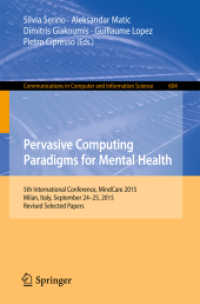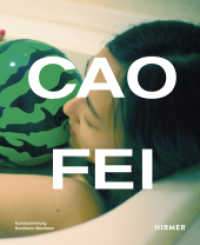Full Description
Refugees face transitions in their lives: on an individual, a social and a cultural level. This book covers various aspects of these transitions and their intersections with educational experiences. Studies from different country contexts show the complex relationships between individual, culture, society and institutions. Examining these relationships and experiences during transitional processes aims to contribute to a deeper understanding of the different types of transitions in the context of refugee education, which may lead to an improvement of support structures in the future.
The aim of this book is to present various aspects of transitions that refugees are facing in their lives and the intersections among these transitions and refugee education. Chapters from different country contexts reveal how refugees engage in several transitional processes due to movement between different countries, their settlement in a new country, as well as the transitions that are inherent to their life-course. Examining the various aspects of such relationships and experiences during transitional processes may help to understand the typologies of different transitions in the context of refugee education.
Transitional processes that the chapters of the book tackle include educational transitions, transformative transitions, cultural transitions as well as social transitions from various refugee groups' perceptions including parents, students, teachers and unaccompanied minors. Several chapters discuss how experience of transition is influenced by rules, regulations, and responses of micro and macro environments, such as local community, institutions, governments at the national and international levels while some other specifically indicate the aspects of transitions taking place in schools.
Contents
From the Contents
1. Inclusive Educational Transitions for Refugees with Disabilities: Intersectionality and the Right to Inclusive Education, Marketa Bacakova
2. Substantive Equality of Refugee Children in Education Acts of Finland and Norway, Mariya Riekkinen & Natallia B. Hanssen
3. Emergent Educational Policies Towards Mainstreaming Migrants in Public Education: the Case of Turkey, Hanife Akar & Anıl Kandemir
4. Migrant Students' Schooling Experiences in Ireland: Perspectives from Parents, Seun Adebayo & Manuela Heinz
5. Finding ways: from imagined to realized educational transitions and trajectories, Anna-Maria Sarstrand Marekovic & Anna Liisa Närvänen
6. Landscaping educational transitions of Syrian students in the primary school context in Turkey: An ethnographic study, Özge Karakus Demirci
7. Syrian refugee families in Iceland: Aspects of transitions in education and society, Hanna Ragnarsdóttir & Susan Refik Hama
8. Building yourself as a UAM: crossing borders is also an inner journey, on the road of oppression, domination and racization, Patricia Mothes & Sandra Cadiou
9. A Tri-Menu Model of Learning to support young Refugee's Cultural Wellbeing in Australia, Karin Mackay
10. Home and Away for Forty Years: Transitional processes of Vietnamese Refugees' journey seeking liberty in Iceland, Anh Dao Katrin Tran
11. Refugee student education in Greece: Approaches and views of their parents, Dimitris Zachos & Aikaterina Pavlidou
12. Perception of education and schools among children and parents of refugees and migrants from Afghanistan: data from Serbia, Stefan Milutinović
13. Engaging parents of refugee backgrounds in their children's education: Insights from Australia, Sharon Wagner & Loshini Naidoo
14. Efforts to Leave Refugee Education Behind by Transition to Inclusive Education, Lisa Katharina Möhlen, Elvira Seitinger
15. Before, in or after transition? Ethnographic insights from the everyday school life of refugee students in Germany and Italy, Lisa Rosen & Fenna Tom Dieck
16. A peer education program for adolescent girls in refugee camps in the Kurdistan Region of Iraq: Coping with transitions, Robyn Henderson & Sazan Mandalawi








